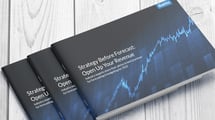We are seeing some interesting trends in expense assumptions for 2022. Looking at this from a very high level, there is an industry-wide assumption of higher operating costs in the coming year. As we dig into this further, we think this is due to labor premiums and efficiencies and the higher costs of consumables. These assumptions are affecting operating costs and eroding margin gained on the increasing revenues by anywhere from 2 to 4 points.
Another item to call out is that bonuses and incentives are now more aligned with revenue projections where they were either missing or dramatically cut in 2021.
 [This blog is an extract from our latest Special Report, Strategy Before Forecast: Open Up Your Revenue. Discover revenue strategy top tips from industry leaders from CBRE, ProfitSword, EY, Accenture, and more, as you plan for 2022 and beyond. Download today: https://www.duettocloud.com/special-reports/strategy-before-forecast]
[This blog is an extract from our latest Special Report, Strategy Before Forecast: Open Up Your Revenue. Discover revenue strategy top tips from industry leaders from CBRE, ProfitSword, EY, Accenture, and more, as you plan for 2022 and beyond. Download today: https://www.duettocloud.com/special-reports/strategy-before-forecast]
In the undistributed departments, there are a few areas where we are seeing higher than normal expense assumptions for 2022. Sales and Marketing spend is already starting to return in 2021 and the projection in 2022 is that spend will be slightly higher than even 2019 margins. Technology is the other area where we are seeing an assumption of more spend compared to 2019 margins. I see this as a positive signal that the industry is investing back into growth and preparing for the next steps.
And lastly, an assumption that is affecting EBITDA is an increase in insurance costs. We are seeing an increase of up to 25% over 2019.
Technology Investment & Labor Efficiencies
We have found that probably the largest consumer of a hotelier’s time is data collection and the normalization of that data to make it useful. In a down cycle there is more volatility in our data and changes in data trends typically happen at a faster pace. That combination creates uncertainty.
Don’t forget that labor is our biggest expense. In a down cycle cost savings are often found by reducing staff. If you are relying on manual processes in a down cycle your workload becomes compounded. It sounds like a lot of work because it is harder to keep up in a fast-paced volatile environment.
However, technology is already helping hoteliers save time by automatically collecting and normalizing data so it can be used in today’s fast-paced environment. The same trends in technology spend that occurred after the down cycle in 2008 are happening today.
Companies are realizing that they can’t do it manually. They don’t have the staff and Excel is not a BI tool. They need to have better tools – a single source of truth. Decision-makers need to have data, they need to have information to be able to make real-time decisions so that they can have the confidence that they need to be able to operate in both the down cycles and, of course, operate better at the upward cycles, which will come soon.
It’s obvious that these last couple of years, including 2019, don’t give us a good baseline for 2022. Many hotels are starting from scratch or relying on a zero-based budgeting approach. However, with the right technology stack and vendor partnerships hoteliers can live in an uncertain world, but still, be confident in their ability to react and endure any situation thrown their way.
Paul Bennie is Vice President of Sales and Marketing at ProfitSword. Founded in 2001, ProfitSword's mission is to provide exceptional business intelligence tools to the business community, specializing in data collection and integration, data analytics, operational functionality, and reporting at all levels of the organization. For more information visit: https://profitsword.com/


